The Distracted Mind: Ancient Brains in a High-Tech World
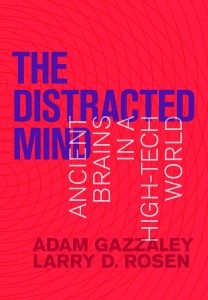 Most of us will freely admit that we are obsessed with our devices. We pride ourselves on our ability to multitask. We feel we can read work email, reply to texts, check Facebook, watch video clips, talk on the phone, send texts, and drive a car … all at the same time. We appear to enjoy family dinners with glowing smartphones next to our plates. We “think” we can do it all, 24/7/365! Never mind the errors in the email, the near-miss on the road, and the unheard conversation at the table. And this constant connection drives our brain chemistry to be in a constant state of high alert which disrupts our work, our interactions and our all-important night’s sleep. In The Distracted Mind, Drs. Adam Gazzaley and Larry Rosen — a neuroscientist and a psychologist — explain why our brains aren’t built for multitasking, and suggest better ways to live in a high-tech world without giving up our modern technology.
Most of us will freely admit that we are obsessed with our devices. We pride ourselves on our ability to multitask. We feel we can read work email, reply to texts, check Facebook, watch video clips, talk on the phone, send texts, and drive a car … all at the same time. We appear to enjoy family dinners with glowing smartphones next to our plates. We “think” we can do it all, 24/7/365! Never mind the errors in the email, the near-miss on the road, and the unheard conversation at the table. And this constant connection drives our brain chemistry to be in a constant state of high alert which disrupts our work, our interactions and our all-important night’s sleep. In The Distracted Mind, Drs. Adam Gazzaley and Larry Rosen — a neuroscientist and a psychologist — explain why our brains aren’t built for multitasking, and suggest better ways to live in a high-tech world without giving up our modern technology.
Wiley Handbook of Psychology, Technology and Society
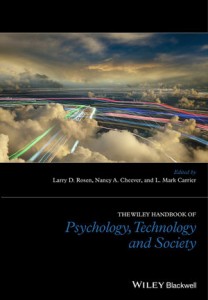 Wiley Handbook of Psychology, Technology and Society (edited by Dr. Larry Rosen, Dr. Nancy Cheever and Dr. Mark Carrier) provides a thoughtful and evidence-driven examination of contemporary technology’s impact on society and human behavior. The Handbook includes contributions from international experts and features comprehensive coverage of current issues including: social networking, Internet addiction and dependency, Internet credibility, multitasking, impression management, audience reactions to media, video gaming, smartphones, tablet computing, and provides analysis of the latest research on generational differences, Internet literacy, cyberbullying, sexting, Internet and cell phone dependency, and online risky behavior.
Wiley Handbook of Psychology, Technology and Society (edited by Dr. Larry Rosen, Dr. Nancy Cheever and Dr. Mark Carrier) provides a thoughtful and evidence-driven examination of contemporary technology’s impact on society and human behavior. The Handbook includes contributions from international experts and features comprehensive coverage of current issues including: social networking, Internet addiction and dependency, Internet credibility, multitasking, impression management, audience reactions to media, video gaming, smartphones, tablet computing, and provides analysis of the latest research on generational differences, Internet literacy, cyberbullying, sexting, Internet and cell phone dependency, and online risky behavior.
iDisorder
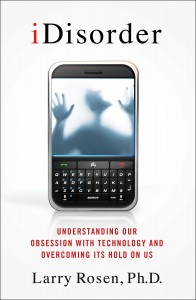 iDisorder: changes to your brain´s ability to process information and your ability to relate to the world due to your daily use of media and technology resulting in signs and symptoms of psychological disorders – such as stress, sleeplessness, and a compulsive need to check in with all of your technology. Based on decades of research and expertise in the “psychology of technology,” Dr. Larry Rosen offers clear, down-to-earth explanations for why many of us are suffering from an “iDisorder.” Rosen offers solid, proven strategies to help us overcome the iDisorder we all feel in our lives while still making use of all that technology offers. Our world is not going to change, and technology will continue to penetrate society even deeper leaving us little chance to react to the seemingly daily additions to our lives. Rosen teaches us how to stay human in an increasingly technological world.
iDisorder: changes to your brain´s ability to process information and your ability to relate to the world due to your daily use of media and technology resulting in signs and symptoms of psychological disorders – such as stress, sleeplessness, and a compulsive need to check in with all of your technology. Based on decades of research and expertise in the “psychology of technology,” Dr. Larry Rosen offers clear, down-to-earth explanations for why many of us are suffering from an “iDisorder.” Rosen offers solid, proven strategies to help us overcome the iDisorder we all feel in our lives while still making use of all that technology offers. Our world is not going to change, and technology will continue to penetrate society even deeper leaving us little chance to react to the seemingly daily additions to our lives. Rosen teaches us how to stay human in an increasingly technological world.
Matar Cohen, a student at the Fashion Institute of Technology in New York City, developed a short animated commercial for the book: http://youtu.be/3EDBpNm9-Kw. Enjoy!
Rewired
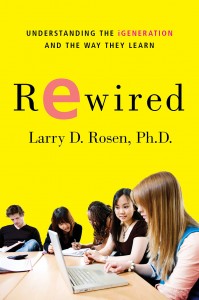 Look around at today´s youth and you can see how technology has changed their lives. They lie on their beds and study while listening to mp3 players, texting and chatting online with friends, and reading and posting Facebook messages. How does the new, charged-up, multitasking generation respond to traditional textbooks and lectures? Are we effectively reaching today´s technologically advanced youth? Rewired is the first book to help educators and parents teach to this new generation´s radically different learning styles and needs. This book will also help parents learn what to expect from their “techie” children concerning school, homework, and even socialization. In short, it is a book that exposes the impact of generational differences on learning while providing strategies for engaging students at school and at home.
Look around at today´s youth and you can see how technology has changed their lives. They lie on their beds and study while listening to mp3 players, texting and chatting online with friends, and reading and posting Facebook messages. How does the new, charged-up, multitasking generation respond to traditional textbooks and lectures? Are we effectively reaching today´s technologically advanced youth? Rewired is the first book to help educators and parents teach to this new generation´s radically different learning styles and needs. This book will also help parents learn what to expect from their “techie” children concerning school, homework, and even socialization. In short, it is a book that exposes the impact of generational differences on learning while providing strategies for engaging students at school and at home.
Me, MySpace, and I
 Young people spend hours online each day online, and their abilities to multitask and communicate are often misunderstood by older generations. Dr. Larry Rosen offers a full overview of the various issues young people may experience in their online worlds (cyberbullying, addiction, sexuality, virtual friendships, and more) while at the same time challenging commonly held beliefs that these communities are damaging. Instead of using scare tactics, the book shows parents how to be proactive and anticipate potential problems. With his extensive background in both child development and the impact of technology, Dr. Rosen uses down-to-earth explanations of sound psychological theory, incorporates groundbreaking research, and shows parents and educators how social networking sites like MySpace and Facebook can improve adolescent socialization skills.
Young people spend hours online each day online, and their abilities to multitask and communicate are often misunderstood by older generations. Dr. Larry Rosen offers a full overview of the various issues young people may experience in their online worlds (cyberbullying, addiction, sexuality, virtual friendships, and more) while at the same time challenging commonly held beliefs that these communities are damaging. Instead of using scare tactics, the book shows parents how to be proactive and anticipate potential problems. With his extensive background in both child development and the impact of technology, Dr. Rosen uses down-to-earth explanations of sound psychological theory, incorporates groundbreaking research, and shows parents and educators how social networking sites like MySpace and Facebook can improve adolescent socialization skills.
TechnoStress
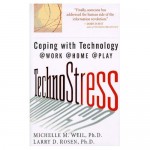 Modern technology was designed to empower us and set us free. So why do we often feel more like its slaves than its masters? From pagers to Web sites, e-mail to fax machines, each new “technohelper” places greater demands on us.
Modern technology was designed to empower us and set us free. So why do we often feel more like its slaves than its masters? From pagers to Web sites, e-mail to fax machines, each new “technohelper” places greater demands on us.
If you’ve ever tried to juggle a steering wheel and a cell phone, or accidentally recorded an infomercial rather than the nightly news on your VCR — then you already know what TechnoStress feels like. In this, the first “must-have” book of the information age, psychologist Michelle Weil and educator Larry Rosen explain why technology makes people feel under the gun — and how to preserve your humanity and sanity in a digital world.
The authors draw on their sixteen years of research into the psychology of technology to show exactly how technology affects our bodies and minds, and the impact it has on our lives at home, at work, and at play. The fascinating vignettes they offer explain why we feel we are losing control to technology, or being hopelessly left behind.
But for all of the problems it identifies, TechnoStress is not another polemic against technology. In fact, the authors are proponents of technology. “Technotherapist” Michelle Weil and researcher Larry Rosen have spent the past two decades showing people how to thrive in the age of high-tech. Rather than teaching you how to avoid technology, they show you how to make it work for you.
